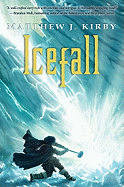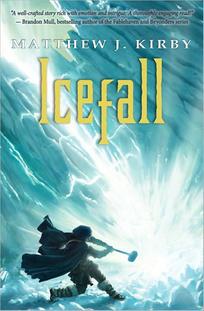
 In Matthew J. Kirby's (The Clockwork Three) spellbinding and suspenseful novel, he takes us to the top of the world, when berserkers still waged war wearing animal skins rather than armor, and skalds lifted berserker battles to legend through their stories.
In Matthew J. Kirby's (The Clockwork Three) spellbinding and suspenseful novel, he takes us to the top of the world, when berserkers still waged war wearing animal skins rather than armor, and skalds lifted berserker battles to legend through their stories.
The king of a Northern land, having refused to marry off his eldest daughter and deed some of his holdings to a nearby chieftain, is now at war. He sends his children--Harald, his youngest and heir to his throne; the beautiful Asa, the eldest daughter; and his middle child, the plain Solveig--to a remote land to keep them safe. The king also sends a handpicked group to accompany them: Bera, the woman who has raised them since their mother died giving birth to Harald, and her son Raudi, as well as Per, one of the king's men, and Ole, a slave who has served the king faithfully. As the novel opens, they await supplies before the winter freezes out any vessel's passage by water. A ship eventually arrives with the king's personal guard--20 hearty berserkers, led by Hake, a giant to rival Thor, and the king's skald, Alric. In the king's hall, one among his loyal subjects and family betrays them--someone has poisoned the berserkers and weakened their ability to fend off the enemy, should they arrive.
Solveig, the only one of the king's children who feels she has no purpose, narrates the story. She shies away from the rough ways of Hake and his men, and wonders if the skald has "a true form underneath all his layers." But Alric plants a seed in Solveig that leads her to a sense of purpose: he tells her that she would make a fine skald. "Memory and sight are all that is required," he coaxes, and he has observed both talents in her. At first, the meaning of Solveig's "sight" appears exactly as Alric describes it--as a skillful ability to pick up on all that unfolds around her. But Solveig also has a recurring nightmare that she fears could be a portent--though her visions do not always transpire in quite the way she expects. As she finds her voice during the course of the cold dark days, she comes to appreciate Alric in a new way: "What Alric does is as necessary to us as eating or drinking, but he feeds something else." Solveig also finds a power greater than Alric's--a way to remain true to her beliefs as she weaves her tales.
Kirby's story peels away like layers of an onion. Two-thirds of the way into the book, Solveig reveals a structure to the novel that serves a dual purpose. Every piece of this puzzle, infused with Norse lore, fits together. --Jennifer M. Brown

